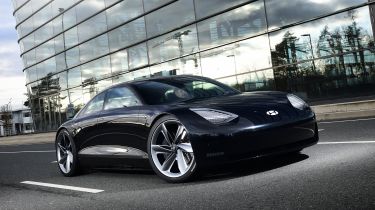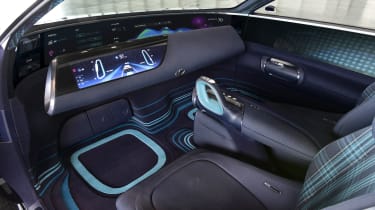Electric Hyundai Prophecy concept points to new flagship saloon
New details and images of the Hyundai Prophecy concept show the brand’s vision for its forthcoming electric cars in the form of a ‘halo’ saloon

Hyundai has revealed further details about its Prophecy concept, which previews a flagship ‘halo’ saloon model and sets the tone for the firm’s forthcoming electric cars.
The Prophecy is the latest in a recent run of fashion-forward concept cars from Hyundai. In 2018, the brand revealed the rakish Le Fil Rouge four-door coupe concept, while 2019 saw the unveiling of a more angular effort, the Hyundai 45. Both sit on the firm’s Electric Global Modular Platform – E-GMP – Hyundai’s first dedicated pure-electric car platform.
Many of the new details centre around the Prophecy’s interior, and chief among them is the lack of a steering wheel. Instead, Hyundai has included a pair of joysticks either side of the driver’s seat. Quite how this works in practice hasn’t been revealed, but Hyundai says it frees up space for other functions. According to the South Korean manufacturer, 90% of the car’s functions can be controlled from buttons on these joysticks.
Hyundai has also used the Prophecy to introduce what it calls its Smart Posture Car System (SPCS), which works to automatically adjust the driver’s seat according to your shape and size. You enter your height and weight and the car adjusts the seat, steering wheel, mirror and head-up display to best suit your physiological needs – according, Hyundai says, to "medically-verified information".
Other new features to be revealed inside the Prophecy include its infotainment screen, which spans the width of the dashboard and can be used in what Hyundai calls ‘relax mode’ – here, the screen rises and the seats recline to allow for optimal viewing of videos (when not driving, of course).
Interestingly, Hyundai has also introduced an air-filtration system on the Prophecy that cleans the air as you drive, both inside and outside. The car features a filtration system that can sense when the interior’s particle levels are high and cleans the air accordingly. This also happens when the car is unoccupied while charging. Hyundai says that the Prophecy’s windows are locked in place thanks to this system’s ability to draw in filtered, clean air. Any excess cleaned air is pumped back out via vents under the rear doors.
Inspired by the Phantom Corsair of the 1930s, the Prophecy has more than a hint of Porsche Taycan to its profile. With the wheels pushed out to the corners, Hyundai claims its latest concept car “realises the benefits of an electric-vehicle platform”.
The sleek, swooping design features short overhangs and a low roofline, plus large wheels and a low beltline that runs all the way from the front to the rear of the car. The front end is fairly conventional, albeit without any kind of grille.
The rear, however, takes a totally different approach. The pixelated light clusters will be a design feature of all Hyundai’s forthcoming electric cars, while the independent, transparent rear spoiler has been created so as not to disrupt the sleek shape of the Prophecy concept.
Luc Donckerwolke, the chief design officer for the Hyundai Motor Group, told DrivingElectric: “We were aiming for a higher sense of emotionality in our product. We realised we had been designing electric cars in the same way as conventional cars.”
The interior is spacious and clutter-free. There's no steering wheel; the car is controlled by a pair of joysticks either side of the driver’s seat. Hyundai says this provides “a completely new, yet reassuringly familiar and intuitive driving experience” and “ultimately enhances passenger safety”.
Designed to offer Level 4 autonomous features – that is, fully autonomous driving with the option for the driver to take control – the Prophecy’s interior has been developed digitally to give users a unique experience. Hyundai says its designers understand the realities of living with a long-range electric car and they wanted to create a relaxing environment that kept people in the car while the batteries are being charged.
“The car industry is changing,” Michel Glenisson, Hyundai’s creative manager for interior design, told us. “The interior is becoming more important; it’s like a treasure box – you want to open the door and find the treasure is inside.”
The dashboard can swivel and hide, giving a clean and minimalist design. However, occupants can also use the full-width screen, controlling all of the car’s functions with buttons on top of the joysticks. The tartan fabric mimics woolen blankets, giving a homely feel and further emphasising the relaxing interior space.
Ultimately, the Prophecy concept will morph into a four-door, saloon-bodied electric car designed as a ‘halo’ model to sit at the top of the Hyundai model range.
Hyundai has not confirmed any powertrain details or a predicted range for the Prophecy, but given the efficiency of its latest all-electric Kona SUV, it’s expected the production-ready saloon would do more than 300 miles on a charge, thanks to a large battery pack.
Donckerwolke told us: “[Prophecy] is definitely a halo car. A lot of companies have given up on the saloon segment. But we have tried something completely different.”
When asked whether the public’s penchant for SUVs would ultimately limit the Prophecy’s success, Donckerwolke said: “We know the SUV segment will lose strength. Everyone is looking to replace the SUV with something more efficient. It is the manufacturer’s responsibility to sell functionality with desirability.
“The Range Rover was an elitist vehicle and it has been democratised,” Donckerwolke said. “SUVs are trying to be more efficient, but they are not efficient. I believe we have to work intensively on other segments.”
That said, Hyundai is unlikely to give up on SUVs just yet – the previous 45 concept looks likely to spawn a production SUV, underpinned by the same scalable electric-car platform.
Most Popular

EV Deal of the Day: Dacia Spring is amazingly good value at £116 per month

EV Deal of the Day: budget-friendly Ford Capri for just £234 a month


